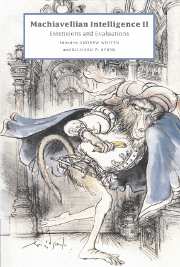Book contents
- Frontmatter
- Contents
- Contributors
- Preface
- 1 Machiavellian intelligence
- 2 Friendships, alliances, reciprocity and repair
- 3 Why Machiavellian intelligence may not be Machiavellian
- 4 Social intelligence and success: Don't be too clever in order to be smart
- 5 Minding the behaviour of deception
- 6 The Machiavellian mindreader
- 7 Exploiting the expertise of others
- 8 Primates' knowledge of their natural habitat: As indicated in foraging
- 9 Evolution of the social brain
- 10 The modulatory of social intelligence
- 11 The Technical Intelligence hypothesis: An additional evolutionary stimulus to intelligence?
- 12 Protean primates: The evolution of adaptive unpredictability in competition and courtship
- 13 Egalitarian behaviour and the evolution of political intelligence
- 14 Social intelligence and language: Another Rubicon
- Index
7 - Exploiting the expertise of others
Published online by Cambridge University Press: 23 November 2009
- Frontmatter
- Contents
- Contributors
- Preface
- 1 Machiavellian intelligence
- 2 Friendships, alliances, reciprocity and repair
- 3 Why Machiavellian intelligence may not be Machiavellian
- 4 Social intelligence and success: Don't be too clever in order to be smart
- 5 Minding the behaviour of deception
- 6 The Machiavellian mindreader
- 7 Exploiting the expertise of others
- 8 Primates' knowledge of their natural habitat: As indicated in foraging
- 9 Evolution of the social brain
- 10 The modulatory of social intelligence
- 11 The Technical Intelligence hypothesis: An additional evolutionary stimulus to intelligence?
- 12 Protean primates: The evolution of adaptive unpredictability in competition and courtship
- 13 Egalitarian behaviour and the evolution of political intelligence
- 14 Social intelligence and language: Another Rubicon
- Index
Summary
In 1988, Byrne and Whiten coined the phrase Machiavellian intelligence to portray primate intelligence as geared primarily to the sorts of conniving we ascribe to Machiavelli — deceit, cunning, and other manipulative, self-serving tactics — in short, to navigating the social, not the physical world. As they point out in this second edition (Chapter 1), intelligence honed for sociality may employ strategies for gaining social advantage beyond self-serving social manoeuvres, such as exploiting others' expertise. Exploiting expertise has many faces, for many reasons. It can aim at varied targets – expertise itself, such as knowledge or skills, or the products of expertise, especially resources such as food. There are two sides to the story of exploitation, as there are with most social stories – the exploiter's and the exploited's. Exploiters come in many guises, from learners and partners to bullies and thieves. So do the exploited, from co-operative, supportive teachers, sharing partners and tolerant mothers, to unwilling, niggardly hoarders or even neutral, naive dupes; and their responses can affect the nature and success of the ploys exploiters use. All these sides of the story suggest a number of broad factors behind primates' efforts at exploiting others (see Table 7.1). Exploitation may also vary within the primates because of differences in intellectual capacity between primate species, notably between monkeys and great apes. This chapter explores some of the ways in which non-human primates exploit one another's expertise and how various tactical roles come into play when they do.
Exploiting others’ expertise
Exploiting others’ knowledge entails the social transfer of knowledge and skills.
- Type
- Chapter
- Information
- Machiavellian Intelligence IIExtensions and Evaluations, pp. 174 - 206Publisher: Cambridge University PressPrint publication year: 1997
- 20
- Cited by



